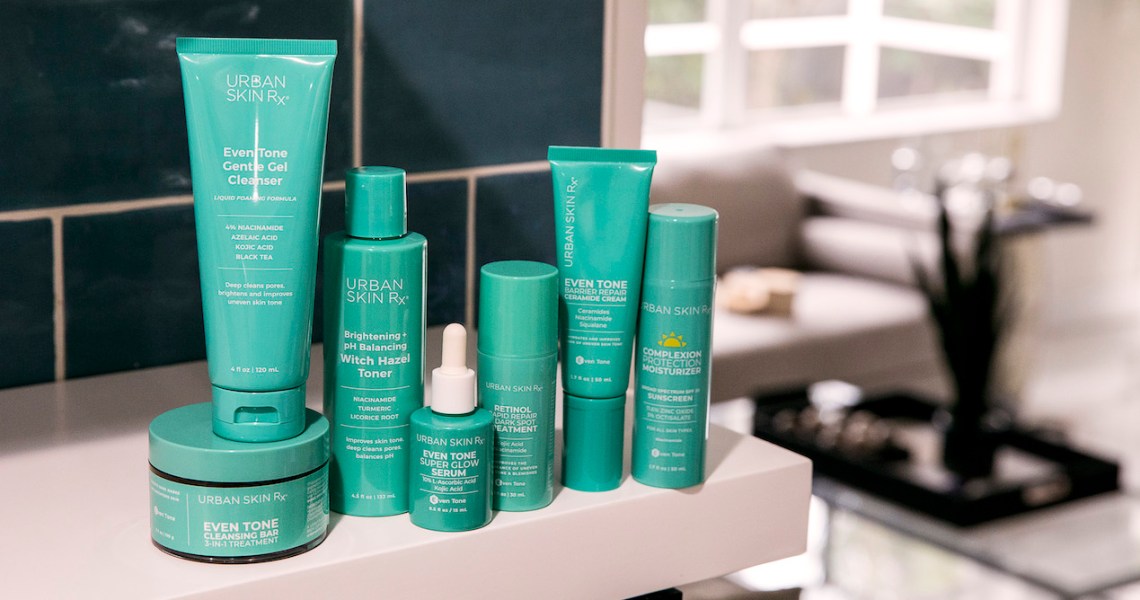Problem-solution skin-care brand Urban Skin Rx wants to build its Gen-Z and Gen-Alpha customer base, relying on a renewed social strategy to help.
Keran Look Loy, vp of marketing at Urban Skin Rx, described 2023 as a “year of transition” for the 13-year-old brand, as it grew sales in its DTC e-commerce, Amazon and retail channels including Ulta Beauty and Target. The Amazon business grew by over 20% between 2022 and 2023, though Loy declined to share DTC and retail figures. Urban Skin Rx hit $30 million in sales in 2021, per previous Glossy reporting.
Notably, Urban Skin Rx also saw its founder and CEO, Rachel Roff, step down in Sept. 2023, which was followed by the appointment of Victoria Payne. With Roff stepping down, it was also an opportunity for Urban Skin Rx to refocus on the efficacy of its clinically-backed products instead of the founder story or an overall brand story. It also offered the brand the chance to recenter on capturing a younger Gen-Z and even Gen-Alpha customer base while also strengthening its core base of millennial customers who are aging into the brand. Gen Z and Gen Alpha represent 5-10% of Urban Skin Rx customers, while millennials are 30-40%, depending on the sales channel. Loy said the goal is for Gen Z and Gen Alpha to drive 15-20% of sales over the next 3-5 years.
“These are going to be the customers of the future in 10 years,” he said. “They’re going to be driving and determining what the skin-care and personal care industries look like. Capturing those customers now, getting their loyalty and driving as much customer lifetime value [as possible] at this point is super important.”
TikTok is the No. 2 social media channel for Urban Skin Rx, following Instagram in terms of engagement and followers. But the goal is to make TikTok No. 1 by the end of 2024, said Loy. Notably, Urban Skin Rx experienced TikTok virality as far back as 2020 when its hero product, the Even Tone Cleansing Bar, saw a 220% sales increase across sales channels. But Loy said that Urban Skin Rx pulled back on influencer marketing expenditures by about 60% in 2023 to focus on performance media. In 2024, the brand is reinvesting that same figure back into influencer marketing to reach a Gen-Z audience. Meanwhile, the performance media investment remains flat year-over-year in 2024.
“The consumer is much more confident in 2024. We see that in the [economic] numbers, and that’s trickling down to the brands, as well,” said Loy. “There was a need for more excitement and inbound traffic coming to the brand on the website and social media, and that will come not only through performance media but also through influencer marketing.”
As part of that influencer and digital marketing focus, the team wanted to use everyday people in a new digital campaign called “Even Tone for All,” focused on the Even Tone collection of 10 products. While everyday people may not be bona fide “influencers,” the idea is to bring in individual voices, similar to influencers, to tell their own skin-care journeys. With that in mind, on Monday, Urban Skin Rx held an open casting call in NYC, soliciting via an Instagram post “all shapes, sizes, ages, genders, skin tones, skin types and skin concerns.” The plan is to have about six people in the final campaign, which will debut on March 12.
“When we started to develop the concept of ‘Even Tone for All,’ the ‘for all’ aspect was the most important part. We wanted to capture a lot of faces, [skin] issues and skin types,” said Anaïs Vandenbosch, creative director at Urban Skin Rx. “You can only [get skin-care stories] from real people; you cannot have that from an agency model.”
In addition to its upcoming campaign, Urban Skin Rx will rely on its four-pillar social strategy to help diversify its content offerings and speak to its varied audiences. The first pillar is before-and-after photos, to show how products directly benefit skin with issues like rosacea, hyperpigmentation and acne. The second is product education, by detailing ingredients, formulation technology and product benefits. The third is people, by spotlighting the aestheticians that Urban Skin Rx regularly works with. And lastly, there’s community, which involves collaborations with other brands via social media giveaways and digital masterclasses via Instagram Live. Loy said all four of these pillars will play a role in the upcoming campaign.
He added there is segmentation regarding how Urban Skin Rx speaks to younger customers versus millennials. TikTok, he noted, allows the brand to be trend-driven. The team looks at weekly TikTok trends and ways the brand can perhaps plug into the conversation. Comparatively, millennials on Instagram are interested in learning about ingredients, what products can be used together, and which products are recommended for use before and after dermatology procedures like laser facials. Vandenbosch said a big communication narrative with Gen Z and Gen Alpha is developing a personal skin-care regimen and being prepared for how that will evolve as they age and their skin alters.
“The reality is you don’t need to have a complicated regimen to maintain your skin. You only need to have the right product for your needs. There is no need for a brand story [when you have] good product,” she said.




